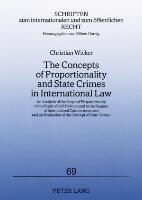Read more
It is generally recognised in both literature and jurisprudence that the notion of proportionality constitutes a key requirement of self-defence and of countermeasures. The determination of the exact content of the proportionality principle is, however, very complex and controversial. In both areas questions such as 'proportionate to what?' or 'what role does the objective of the response play?' arise. Elucidation of the scope of proportionality in the two spheres in which it is most contentious is thus sought. Ever since the abandonment of former Draft Article 19 the term 'State crime' no longer exists. This study demonstrates that consequently a State can no longer commit an international crime. Yet it also shows that by applying more serious consequences to the commission of a serious breach of peremptory norms the idea behind the concept does add something valuable to the existing concepts of jus cogens and obligations erga omnes.
List of contents
Contents: Proportionality in the right of self-defence - The relationship between jus ad bellum and jus in bello - Proportionate to what? - Proportionality in the law of international countermeasures - Determination of proportionality at two levels - The German principle of 'Verhältnismäßigkeit' - The concept of State crimes - Replacement of former Draft Article 19 by the present Draft Articles 40 and 41 - The concepts of jus cogens and obligations erga omnes.
About the author
The Author: Born in 1976, Christian Wicker studied law at the Universities of Konstanz and Frankfurt am Main. After the First State Examination in 2000, he worked for international banks and law firms in Dublin and London. In 2002 he completed an LL.M. programme at Durham University (England). Following the Second State Examination in Frankfurt in 2004 the author was admitted to the Chamber of Lawyers in 2005. He currently works in a law firm in Frankfurt am Main.

